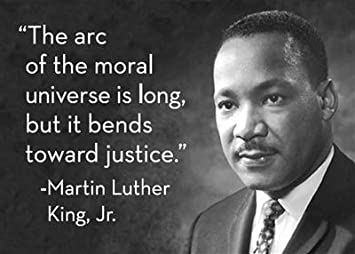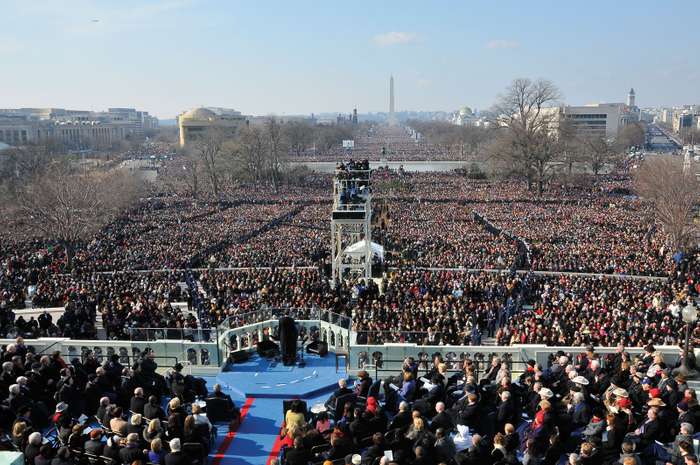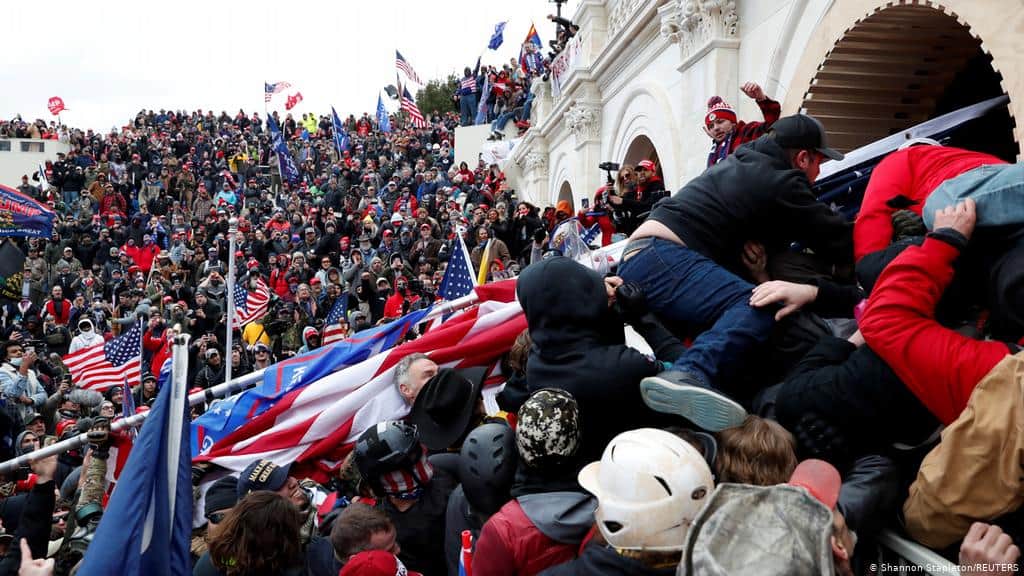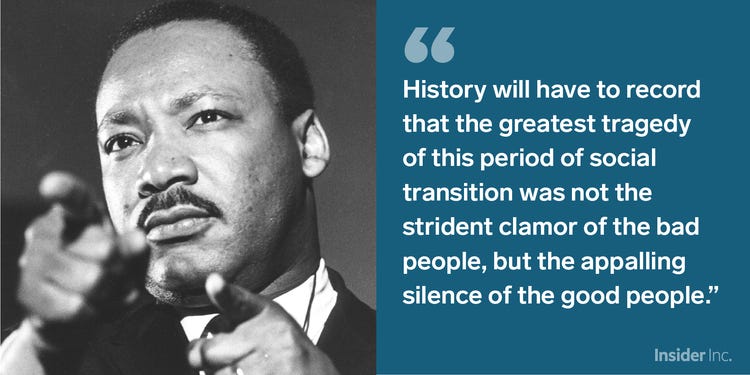
Race and Reconciliation in Post-Trump America

Thoughts on the day we remember Dr. Martin Luther King, Jr. What Would Martin Make of All of This?
I’m old enough to remember an inauguration that people hailed as signifying the “post-racial” America. I was one of hundreds of thousands of Americans, maybe even a million or more, sitting in that crowd in the photo above cheering as Barack Obama took the oath of office in 2009, becoming the first Black president of the United States. We were giddy then about “hope and change” after years of terrorism, war and economic collapse. The crowd on the west lawn of the U.S. Capitol spilled down the Mall all the way to the Washington Monument, and it was hard to find anyone who was not positively thrilled that a new day had arrived in America.
How naive that joy seems today! The latest crowd on the west lawn of the Capitol were insurrectionists, seditionists, white supremacists clad in camo, packing heat while waving confederate flags and pledging allegiance to their hero, outgoing President Donald J. Trump who instigated the violent invasion of the U.S. Capitol in a failed attempt to stop the certification of the election of Joe Biden as the next president. Make no mistake: Trump incited this insurrection, and it wasn’t just in one speech, nor in just his repeated false claim since November 3 that he won the election of 2020; in fact, he has been inciting a climate ripe for right-wing violence since he came down the elevator at Trump Tower to announce his presidential campaign in 2015.

Racial hatred, suspicion and fear have been debilitating characteristics of U.S. society since colonial days. As much as President Obama’s election seemed an inflection point for the better, in fact, in so many ways the 8 years of his presidency served as a rallying point for the virulent streams of racism and white supremacy that have always been running just below the surface of American society. Trump capitalized on the fears and hatreds of that section of the American electorate to win his 2016 election. As New York Times journalist Nikole Hannah-Jones wrote immediately after Trump’s election in 2016, “There has never been a moment in America in which black people’s gains have not been perceived by some white Americans as their loss.” (The End of the Postracial Myth, November 15, 2016) (Note that Hannah-Jones is also the principal author of The 1619 Project)
Trump spent a good deal of his time in office focused on wrecking Obama’s work. From the recission of DACA to repeated attempts to overturn the Affordable Care Act to rolling back many rules for environmental protection to reneging on the Paris Climate Accord to cancelling the Iran nuclear pact to raising new barriers to productive relations with Cuba, Trump did everything possible to trash Obama’s work. This was not just a matter of ideological difference; Trump’s rhetoric and actions were consistently laced with flavors of hate and contempt that went well beyond political differences of opinion.
Beyond trying to obliterate Obama’s legacy, Trump’s response to specific issues of racial hatred revealed his true intent. From his callous remarks about “good people on both sides” after Charlottesville to his “Mexican rapists” and “animals” characterizations of undocumented immigrants to his refusal to admit to any police misconduct as case after case emerged of Black persons assaulted and killed by police, Trump clearly enjoyed goading his “base” into increasingly hostile racial ideology. In what were, by comparison, much milder racial offenses, he attacked the 1619 Project and established a “Patriotic Education” commission; he issued an order banning diversity training in government agencies and contractors. During the campaign, he repeatedly claimed that Joe Biden would allow “low income” people to flood into “suburban neighborhoods” which was a clumsy but effective use of racial inference to raise hackles among susceptible whites who seem ready to believe just about any demented myth about African Americans.
All of this messaging was playing to his base, people hearing a continuous recording of racist rhetoric and fearmongering, people being told that a Biden win would destroy everything they cherished, lead to “socialism” portrayed as some kind of special lefty hell — don’t tell grandad about Medicare and Social Security, gosh darn it! The real hell was the possibility that a Black/Asian Woman would become vice president, that the presidential Cabinet would turn from blindingly white to the color spectrum, that DACA students would be able to come out of the shadows once more, that immigrants could look to the U.S. with hope again, that Black Americans might flex their rightful voting power and defeat Senate candidates whose records on racial justice and social equity are unacceptable.
The mob that attacked the U.S. Capitol on January 6 was comprised of a number of surprisingly well-educated and economically secure people who have not suffered deprivation in their lives. They flew in for the riot. They had drinks in the lobby of the Grand Hyatt after smashing the windows of the Capitol. They celebrated trashing Speaker Pelosi’s office with good scotch. From all videos and photos, they were almost all white. And they committed violent, treasonous, unforgiveable actions against the United States because of their belief that they are superior, that their power is in danger. The Lost Cause has been their cause, and stopping the certification of Joe Biden’s election was their means to retain power and control in the country. They knew that because Donald Trump told them so. “Take Back America” from whom? They and Trump and his apologists seem unconcerned or obtuse or just outright contemptuous of the vast majority of Americans who not only elected President Biden, but who want to live in a peaceful, productive, racially and socially just society.
On Wednesday, January 20, 2021, at noon we will officially enter the Post-Trump era. Blessedly, and we hope, in peace. But alas, because of the mob insurrection, because of the utterly debased and demented influence of Donald Trump that incited the riot, the millions of citizens who would love to assemble peacefully on the Mall to witness the Biden/Harris inauguration will be unable to do so. Missing the event is a small thing, but the vacant Mall will be a gross indictment of the racist, indeed, fascist damage inflicted on our country by Trump and his followers.
President Biden and Vice President Harris, God Bless Them, have their work cut out. But they can’t do it alone. They need all of us — the great majority of Americans — to work with them to repair the damage of the insurrection and all that came before it.
Which leads to the idea of Reconciliation — an essential step forward for a good society that has experienced such a great convulsion, but impossible unless and until we deal with the truth of what has happened, and the responsibilities of the parties who caused the breach.
What Would Martin Make of All of This?
Dr. King would certainly have the right words for the perpetrators of the insurrection, and he would be unsparing in exposing their racial sins. He would be incisive about the damage done to society when people allow themselves to believe the repeated lies of those who are clinging to power.
But Dr. King would also, I’m sure, want an active and constructive process of reconciliation — not just good words, but the hard work of getting those responsible to confess, to acknowledge their roles in creating the conditions that led to insurrection, that encourage racists to breed through generations. He would challenge all of us to face the truth of this country’s long and deep embrace of racism, that we still have unfinished business from 1619 and 1776 and 1865 and 1964 and all the years along the way. He would remind us that his dream is woefully unfulfilled, as is the dream of the founders of the nation who wrote lofty words about “liberty and justice for all” while owning slaves and not really meaning “all” in the sense of all of us.

(South African Archbishop Desmond Tutu has some good words for us to think about.)
Reconciliation means that we all have to come to the table; that each person has to own the truth of their role and responsibility for creating the kind of society we must shape together.
Reconciliation also means that after personal confession comes confrontation of others who are also responsible. Some critical institutions and leaders have failed American society on issues of truth and racial justice. Among those that need confrontation and challenge to conscience are the many Christian denominations whose adherents waved “Jesus Saves” and other religious signage while vandalizing the U.S. Capitol; the religious leaders who encouraged their flocks to believe that Trump really won the election; the U.S. Catholic bishops who have been so disappointingly silent on the riot.
We educators must also hold ourselves and our institutions accountable. I wrote a piece about this in the Chronicle of Higher Education and will have more to say on this topic in the weeks ahead. The assault on the Capitol was a failure of education at many levels, provoked by the stunning lies of the president about the election, but also demonstrating a total breakdown of reasonable behavior and historical knowledge among those participating. The racial divide in this country is part of the failure of education, not only in terms of what we teach but even in the very structure of our work, from the chronic segregation of public schools nearly 70 years after Brown v. Board of Education, to the mincing words of too many elite colleges and universities that say they’ll do better one of these days about access.
After confession and confrontation, reconciliation also leads to forgiveness. But not the kind of blame-less “unity” that some members of Congress and other Trump supporters are bleating about right now, a kind of bleached-out insincere effort to paper-over the horrors exposed on January 6. Reconciliation demands accountability, and forgiveness can only come when accountability is fully achieved. Accountability is not revenge, as some Trump supporters in Congress allege, but rather, the moral acceptance of the need for atonement on the way to reconciliation and forgiveness.
The late Senator Ted Kennedy had a favorite quotation: “The work goes on, the cause endures, the hope still lives, and the dream shall never die.” This country emerged from a dream, a dream that in the 18th Century was shared among privileged white male landowners who wanted to govern themselves free from the entanglement with a king an ocean away. They created an idea of self-government that has become the world’s longest-running experiment in Democracy. But from the start, this dream was flawed because of slavery, because Blacks and women and poor people were largely left out.
Dr. Martin Luther King called this nation to lift up the dream in a new way, to create the more inclusive, free and just society that would allow all people to flourish in peace and prosperity. We have seen flashes of times when this can happen, but we have seen flashpoints when some want to deny and defeat the dream for others. But the hope of that more just, more equal, more durable society still lives. It’s up to us, now, to pick up the pieces and do the hard work of restoring the ability of this society and its people to create a better fairer, more just and peaceful society than what we have right now.
